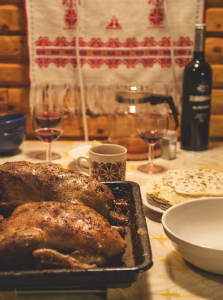5 Tangible Ways to Ease Political Tensions During the Holidays
 Guest Post by Emily J. Hooks
Guest Post by Emily J. Hooks
Do you have a little extra apprehension about the holidays this year? Wonder how you will handle the uncle or second cousin who voted for “the other guy?” What about the sibling who can’t help but gloat?
We’ve all heard the expression, “Never talk about religion, politics, or money at the dinner table.” That is going to be harder this year than ever, and it may also be a missed opportunity because it is empathy and understanding within families that plant the seeds of tolerance in communities and the world. Tolerance is cultivated by getting to know and respecting the views of those different than us. This isn’t only true for “them.” It is also true for “us.”
So, how do we, on a practical level, embrace our differences to build bridges when many of us are experiencing shock, even grief after the election this year? As we move into a time of thanksgiving, we need to prepare for the inevitable conversations that will unfold. How can we handle our heartache and indignation while living by the values of inclusion, diversity, and acceptance?
As a forgiveness expert and the author of, The Power of Forgiveness: A Guide to Healing and Wholeness, I began by reminding myself of the values that inform the way I live my life. I have had to investigate the ideas of tolerance, human rights, diversity, compassion, and empathy and ask myself, “Am I living all of these values today, as I am challenged to understand views so different than my own?” With honest reflection, what I found was that some of my core beliefs had been tested. I have been deeply challenged to stay present to my truth and to live it. Yet, I know these principles to be more important now than ever.
When someone has a worldview we cannot with any amount of reflection and willingness comprehend, we become fearful. Why? Because the unknown and unknowable scare us. We cannot predict the outcome, and therefore, the impact in our lives. We feel helpless in our inability to grasp something so different from ourselves. We feel powerless to do the one thing we know we must do: protect ourselves, those we love, and the values upon which we base our lives, which for many include protecting the civil liberties and the well-being of our fellow human beings. So, we react to defend. It makes sense. If you think you might be in danger, you react.
The problem with taking action from this place is that fear manifests fear. Another issue with this type of response is that we always find what we look for. When we position ourselves to defend, we are less likely to see other possibilities. And, when someone senses us defending even if they did not intend to cause harm they put up their defenses. We become locked in a battle that may have been avoided. We become locked in a battle we, in part, created.
So, what is the alternative? Here are five practical steps each of us can take to prepare ourselves to maintain our values, allow others to express themselves, and take steps to narrow the political divide.
- Honor how you feel. Before the big get together, allow the fear to move through you and cultivate an experience of love. Spend time getting back in touch with love. It is the only source energy that will create an outcome that reflects the values of equality, freedom, and true justice.
- Prepare by getting centered and cultivating compassion. When we move into crisis-thinking, we tend to stop doing the very things that nurture our capacity to have a deeper understanding of the human experience. Purposefully make time to continue these activities, which include self-care, having fun, and spending time with (likeminded) loved ones.
- Remember not to take it personally. Your father’s perspective is not about you. It is about him. His point-of-view is informed by his experiences and the way he knows to react to them. Even if you don’t get it, you can remember that he, like us all, is doing the best he can. And, you won’t sway anyone’s perspective by telling them they are wrong or ignorant. You will, however, make an impact by demonstrating values that create happiness, because wanting contentment is the one thing most of us have in common.
- Take a break when you need to. If you’re anything like me, you might need to get centered more than once. Use a simple short meditation or breathing exercise to keep your physiological responses in check.
- Exercise empathy, above all else. Empathy is a feeling. When we allow ourselves to feel what another might feel, we connect with them on the most fundamental level. It is not a judgment, as in, “Oh, they just don’t get it. That is so sad.” If you inquire within, you might find that any judgment you have about “them” actually causes suffering. Judgment blocks the source energy of love by creating separation.
This Thanksgiving and Holiday Season we have a great opportunity. We have the chance to demonstrate the values that lead to healing in us and the world. We have the chance to show others we might not otherwise be able to touch. Jesus said, “Love heals all wounds.” The Buddha said, “Love transforms suffering.” That is the source of our power to change the course of history, starting at home.
Emily J. Hooks is an author and founder of the Forgiveness Academy. Visit The Power of Forgiveness Kickstarter page to pre-order the book, meet the author, and learn more about the book that’s empowering the world with the personal healing practice of forgiveness.









